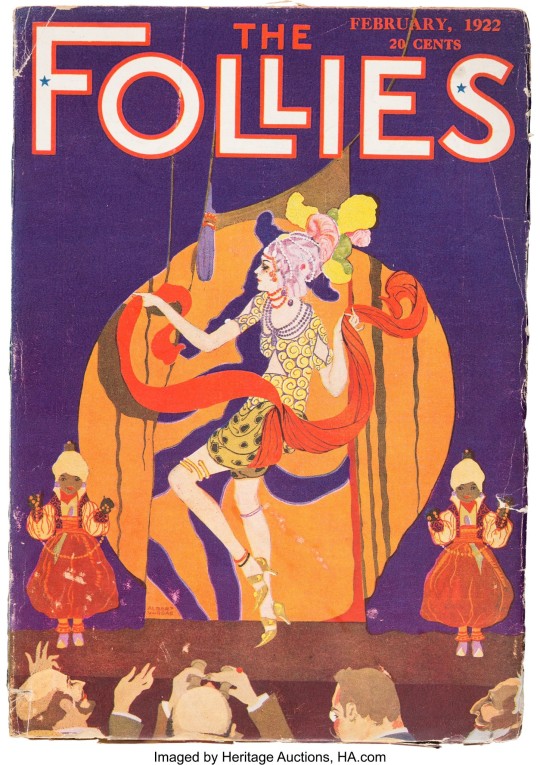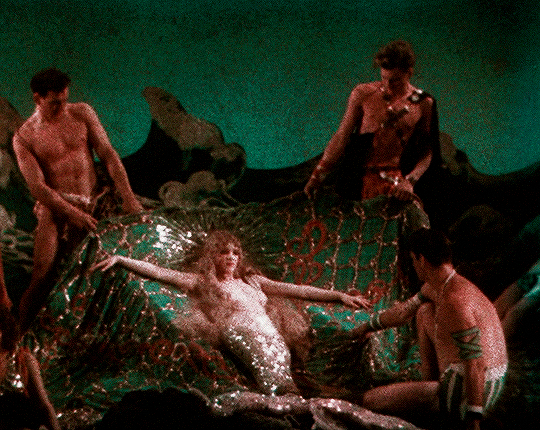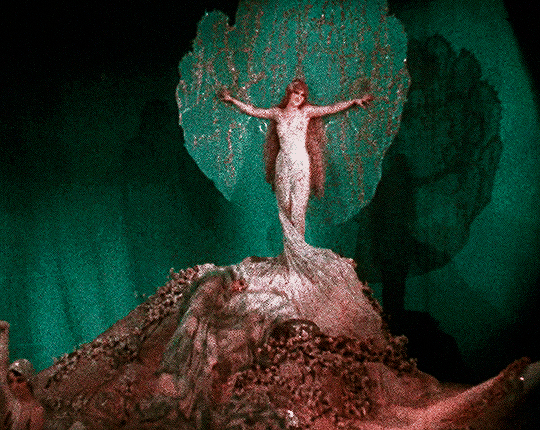#THE FOLLIES
Text

Overcome by an indefinable malaise at the sight of these drawings – the same sort of malaise he experienced when he looked at certain rather similar Proverbs by Goya, or read some of Edgar Allan Poe’s stories, whose terrifying or hallucinating effects Odilon Redon seemed to have transposed into a different art – he would rub his eyes and turn to gaze at a radiant figure which, in the midst of all these frenzied pictures, stood out calm and serene: the figure of Melancholy, seated on some rocks before a disk-like sun, in a mournful and despondent attitude.
— Joris-Karl Huysmans, Against Nature, transl by Robert Baldick, (2003)

#Canvas of the Soul#French#Joris-Karl Huysmans#Against Nature#Robert Baldick#(2003)#Francisco Goya#Los disparates#The Follies#Proverbios#Edgar Allan Poe#Odilon Redon
13 notes
·
View notes
Text

Vintage Pulp - The Follies (Feb1922) (Les Boulevards Publishing)
Art by Alberto Vargas
#Pulp#The Follies#Vargas#Alberto Vargas#Art Deco#Magazines#Pulp Art#Pulp Illustration#Vintage#Art#Theater#Follies#Les Boulevards Publishing#1922#1920s#20s#Illustration#Flappers
90 notes
·
View notes
Photo

1927 Ziegfeld Follies Showgirl Jean Ackerman with necklace, Photo by Alfred Cheney Johnston.
THE FOLLIES
Jean was a beautiful child and delighted in all the attention that was bestowed upon her. This love of attention played an important role in drawing her to the lights of the stage and specifically to the doorstep of Florenz Ziegfeld.
The Ziegfeld Follies reigned supreme on the Great White Way throughout the 1910s and 1920s. Inspired by the Folies Bergère of Paris, the Follies enticed young girls from far and wide. The elaborate stage productions, lavish costumes (and the lack of them!) and spectacular song and dance numbers appealed to many of the impressionable girls looking to escape their mundane and in many cases poverty-stricken lives.
It is not known exactly how Jean came to call on Florenz Ziegfeld, but the master showman himself was the one who interviewed her. It wasn’t long before she was the toast of the town. Her name started appearing in the papers, she was receiving diamond jewelry from suitors and she was invited to fabulous parties (most notably ones thrown by scandalous mayor of New York City, Jimmy Walker). She quickly became acquainted with the famous celebrities of the day and dated quite a few of them as well.
Jean performed for Ziegfeld in the 1927 Follies, “Rosalie” and “Whoopee!” in 1928, “Midnight Frolic” in 1929 and “Smiles” in 1930. At some point during this time, she married Richard “Dick” Ackerman. Little is known about this marriage or the groom. Jean divorced him in January of 1930.
Although her run with the Follies only spanned four years, Jean always looked back on them as the best years of her life. (x)
#1927#ziegfeld follies#ziegfeld follies showgirl#Showgirls#jean ackerman#pearl necklace#alfred cheney johnston#the follies#follies
7 notes
·
View notes
Text
2/26/24.
The Follies (New York) are a band that sounds right at home on Feel It Records. What if The Toms sounded more punk? Here you go.
I love the Bandcamp write-up: "Think Love and Arthur Lee, or even the Kinks' own Arthur. Brit pop & pub rock shouldered up to the shimmering guitar jangle of Haight-Ashbury, but arranged by Punks."
This also reminds me of the anthemic, sing-along power punk of Terrible Feelings.
1 note
·
View note
Text
The Follies Release New Single From Upcoming Album
Photo courtesy of the band.
The Follies are back with a new single, “I Idled”, ahead of the release of their upcoming album Permanent Present Tense.
A new beginning with familiar roots. No matter how you slice it, Permanent Present Tense is a high test trek to the forefront of rock’n’roll’s boundless canvas. The Follies have spent a collective lifetime in dark, amplified dives (see: Vanity,…

View On WordPress
0 notes
Text

Photographed by Martin Schoeller for The New Yorker in 2002:
"I was hired by the New Yorker in 2002 to photograph Robin Williams, and after doing my research what stood out most for me was that he was a very physical comedian. I came up with this idea to photograph him swinging from a chandelier in a grand hotel room. Most publicists shoot down these kinds of wild ideas, so I didn't tell anyone what I was up to, but rigged up a chandelier at the Waldorf Astoria hotel for him to swing from. When Robin got there and saw what was happening, he lifted up his shirt and showed me this enormous scar on his shoulder. He'd just had surgery and couldn't so much as lift his arm. He was so disappointed! He really felt bad about not being able to do it, because he loved the idea and really wanted to help me accomplish my vision.
Unlike most Hollywood stars, he was unfazed by his success and position. He talked to everyone from stylists to the crew, to the hotel staff. We ended up asking a maid at the hotel to swing from the chandelier instead, and I asked him to just sit there and read a newspaper, which I think in the end was an even funnier, more unexpected picture.
[Follies Of God]
#Follies of God#Martin Schoeller#The New Yorker#Robin Williams#my favorites#photography#portrait#characters#humor
56K notes
·
View notes
Text

ending the year with the gay icon that is southern gentlemen detective benoit blanc
#benoit blanc#knives out#glass onion#daniel craig#benoit blanc sang follies in the first movie#and was playing among us with sondheim and angela lansbury#and people still think he's straight#i see u benoit blanc#navyblueart#my art
29K notes
·
View notes
Text

Paul Auster, The Brooklyn Follies
#i know it's silly but i like it when people here reblog poems and quotes where a month is mentioned during the month#and this one says june and it's october 💔 i'm sorry lol#paul auster#the brooklyn follies#quote
6K notes
·
View notes
Text

lets be real he wouldnt even last 10 Seconds this screenshot is generous
[killer by rahafwabas, original -> here <-]
#i saw this post and knew instantly#What I Had To Do...#badly drawn utmv#undertale au#undertale multiverse#utmv#killer sans#the Return of ..#-mod folly#⚠️
2K notes
·
View notes
Photo







Glorifying the American Girl (1929) dir. Millard Webb
#mary eaton#ziegfeld follies#glorifying the american girl#filmedit#old hollywood#oldhollywoodedit#classicfilmedit#vintagedit#costumeedit#vitage#jp=2#*gtam
7K notes
·
View notes
Text

Them ❤️
(follies)
#chapter 10!#this is one of my favorite follies arts ❤️#drarry#drarry fanart#drarry art#draco malfoy#drarry fic#harry potter#fic rec#itsphantasmagoria#mallstars#follies of an ornamental hermit
536 notes
·
View notes
Text
Zuck’s gravity-defying metaverse money-pit

Tomorrow (Oct 31) at 10hPT, the Internet Archive is livestreaming my presentation on my recent book, The Internet Con.

Think of everything that makes you miserable as being caught between two opposing, irresistible, irrefutable truths:
"Anything that can't go on forever eventually stops" (Stein's Law)
"Markets can remain irrational longer than you can remain solvent" (Keynes)
Both of these are true, even though they seemingly contradict one another, and no one embodies that contradiction more perfectly than Mark Zuckerberg.
Take the metaverse.
Zuck's "pivot" to a virtual world he ripped off from a quarter-century old cyberpunk novel (reminder: cyberpunk is a warning, not a suggestion) was born of desperation.
Zuck fancies himself an avatar of the Emperor Augustus (that's why he has that haircut) (no, really). The emperors of antiquity are infamous for getting all weepy when they run out of lands to conquer.
But the lachrymosity of emperors has little causal relationship to the anxieties of tech monopolists! Alexander weeps because he just loves a good conquest and when he finishes conquering the world, he's terminally bored. That's not Zuck's problem at all. When Zuck attains monopoly status, his company develops an autoimmune disorder, as his vicious princelings run out of enemies to destroy and begin to knife one another.
Any monopoly faces these destructive microincentives, but tech is exceptional here because tech has the realtime flexibility and speed that brick-and-mortar businesses can never match:
https://pluralistic.net/2023/02/19/twiddler/
Sociopaths with tech monopolies are worse for the same reason that road-rage would be worse in a flying car: adding new capacity to indiscriminate self-destructive urges turns ordinary car crashes into low-level airburst warfare:
https://pluralistic.net/2023/07/28/microincentives-and-enshittification/
The flexibility of digital gives tech platforms so much latitude to break things in tiny increments. A tech platform is like a Jenga tower composed of infinitely divisible blocks. The Jenga players are the product managers and executives who have run out of the ability to grow by attracting new business thanks to their monopoly dominance. Now they compete with one another to increase the yield from their respective divisions by visiting pain upon the business customers and end users their platform connects. By tiny increments, they increase the product's cost, lower its reliability, and strip it of its utility and then charge rent to restore its functionality:
https://pluralistic.net/2023/10/24/cursed-bigness/#incentives-matter
This is the terminal stage of enshittification, the unstoppable autocannibalism of platforms as they seek to harvest all the value created by business customers and end users, leaving the absolute minimum of residual value needed to keep both stuck to the platform. This is a brittle equilibrium, because the difference between "I hate this service but I just can't stop using it," and "Get me the fuck out of here" is razor-thin.
All it takes is one tiny push – a whistleblower, a livestreamed mass-shooting, a Cambridge Analytica – and people bolt for the doors. This triggers the final stage: the "pivot," which is a tech euphemism for "panic."
For Zuck, the pivot got real after a disappointing earnings call triggered a mass sell-off of Facebook stock, history's worst one-day value incineration, which lopped a quarter of a trillion dollars off the company's market cap:
https://www.bloomberg.com/news/articles/2022-12-19/dramatic-stock-moves-of-2022-led-by-meta-dive-nordic-flash-crash
This was when the metaverse became the company's top priority.
Now, in my theory of enshittification, the step that follows the pivot is death: "Finally, they abuse those business customers to claw back all the value for themselves. Then, they die":
https://pluralistic.net/2023/01/21/potemkin-ai/#hey-guys
Many people have asked me about the conspicuous non-death of Facebook! That's where I have to fall back on Stein's Law: "Anything that can't go on forever eventually stops." Facebook can't continue to annihilate value, alienate its workers, harm the public, hemorrhage money in support of a mediocrity's cherished folly forever. Can it?
Admittedly, it sure seems like it can. Facebook's metaverse pivot has thus far cost the company $46,500,000,000. That is: $46.5 billion. That's even more money than Uber torched, seeking to maintain the illusion that they will be able to create monopolies on both transport and the labor market for driving and recoup the billions the Saudi royal family let them use for the con:
https://pluralistic.net/2022/02/11/bezzlers-gonna-bezzle/#gryft
Don't worry: the Saudi royals are fine! They cashed out at the IPO, collecting a tidy profit at the expense of retail investors who assumed that a pile of shit as big as Uber must have a pony under it, somewhere:
https://pluralistic.net/2023/05/19/fake-it-till-you-make-it/#millennial-lifestyle-subsidy
Uber has doubled the cost of rides and halved drivers' wages, using illegal gimmicks like "algorithmic wage discrimination" to squeeze a little more juice out of the nearly exhausted husks of its workforce:
https://pluralistic.net/2023/04/12/algorithmic-wage-discrimination/#fishers-of-men
But Stein's Law hasn't been repealed. Drivers can't drive for sub-subsistence wages. Do that long enough and they'll literally starve: that's what "subsistence" means. We lost a decade of transit investment thanks to the Uber con, at the same time as traditional taxi drivers were forced out of the industry. Uber can't be profitable and still pay a living wage, and the fantasy of self-driving cars as a means of zeroing out the wage-bill altogether remains stubbornly, lethally unworkable:
https://pluralistic.net/2022/10/09/herbies-revenge/#100-billion-here-100-billion-there-pretty-soon-youre-talking-real-money
Which means we're at the point where you can get off a commuter train at a main station and find yourself stranded: no taxis at the taxi-queue, no busses due for an hour, and no Uber cars available unless you're willing to pay $95 for a ten-minute ride in a luxury SUV (why yes, this did happen to me recently, thanks for asking).
As more and more of us are exposed to these micro-crises, the political will to do something will increase. This can't go on forever. "Don't use commuter rail" isn't a viable option. "Walk three miles each way to the commuter rail station" isn't viable either. Neither is "Pay $95 for an Uber to get to the station." Something's gotta give…eventually.
"Eventually" is the key word here. Remember the corollary of Stein's Law: Keynes's maxim that "markets can remain irrational longer than you can remain solvent." Sure, anything that can't go on forever eventually stops, but that is no guarantee of a soft landing. You can't smoke two packs a day forever – but in the absence of smoking cessation, the eventual terminus of that habit is stage-four lung cancer. Keep hammering butts into your face and your last smoke will come out a crematorium chimney.
Zuckerberg hasn't merely blown a whole-ass Twitter on the metaverse with nothing to show for it – he's gotten richer while doing it! In the past year, his net worth increased by 130%, to $59 billion, thanks to an increase in Facebook's share-price, driven by investors who stubbornly remain irrational, keeping the Boy Emperor solvent long past any reasonable assessment of his performance.
What are these investors betting on? One possibility is that the rise and rise of Facebook's share-price represents a bet on technofeudalism. Since the Communist Manifesto, Marxists have been predicting the end of capitalism. That end seems to have come, but what followed capitalism wasn't socialism, it was the return of feudalism, an economic system where elites derive their wealth from rents, not profits:
https://pluralistic.net/2023/09/28/cloudalists/#cloud-capital
Profit is the income you get from investing in capital – machinery, systems, plant – and then harvesting the surplus value created by workers who mobilize this capital. Capitalism produces massive returns for its winners – in the Manifesto's first chapter, Marx and Engels just geek out about how productive and dynamic this system is.
But capitalism is also a Red Queen's Race, where the winners have to run faster and faster to stay in the same place. Capitalism drives competition, as other would-be winners pile into the sector, replicating the systems that the current winners are using and then improving on them. This is why the prophets of capitalist end-times like the FBI informant Peter Thiel say that "competition is for losers."
Capitalism's "profits" stand in contrast to the feudalist's "rents." Rents are income you get from owning something that other people need to produce things. The capitalist owns the coffee-shop, but the feudalist owns the building. When a rival capitalist opens a superior coffee-shop and drives the old shop out of business, the capitalist loses, but the rentier wins. Now they can rent out an empty storefront in the neighborhood everyone's coming to because of that hot new cafe.
Feudal and manorial lords also made their fortunes by extracting surplus value from workers, but these rentiers don't care about owning the means of production. The peasant in the field pays for their own agricultural equipment and livestock – control over the means of production is necessary for worker liberation, but it's not sufficient. The worker's co-op that owns its factory can still find the value it produces bled off by the landlord who owns the land the factory sits on.
The jury's still out on whether American workers really see themselves as "temporarily embarrassed millionaires," but America's capitalists have a palpable, undeniable loathing for capitalism. The dream of an American "entrepreneur" is *PassiveIncome: money you get from owning something capitalists and/or workers use to create value. Digital technology creates exciting new possibilities for rent-extraction: a taxi-operator had to buy and maintain a car that someone else drove. Uber can offload this hassle onto its drivers and rent out access to the chokepoint it created between drivers and riders, charging all the traffic can bear. This is feudalism in the cloud – or as Yannis Varoufakis calls it, cloudalism.
In Varoufakis's Technofeudalism, he describes Amazon as a feudal venture. From a distance, Amazon seems like a bustling marketplace of manic capitalism, with sellers avidly competing to offer more variety and lower costs in a million independently operated storefronts. But closer inspection reveals that Amazon is a planned economy, not a market.
Every one of those storefronts pays rent to the same landlord – Amazon – which determines which goods can be offered for sale. Amazon sets pricing for those goods, and extracts 45-51% of every dollar those sellers make. Amazon even controls which goods are shelved at eye-height when you enter the store, and which ones are banished to a dusty storeroom in a distant sub-basement you'll never find:
https://pluralistic.net/2023/06/14/flywheel-shyster-and-flywheel/#unfulfilled-by-amazon
Zuck's metaverse is pure-play technofeudalism, Amazon taken to the logical extreme. It's easy to get distracted by the part of Zuck's vision that will convert us all into legless, sexless, heavily surveilled low-resolution cartoon characters. But the real action isn't this digitization of our fleshy wants and needs. Zuck didn't spend $46.5B to torment us.
The cruelty isn't the point of the metaverse.
The point of the metaverse is to rent us out to capitalists.
Zuck doesn't know why we would use the metaverse, but he believes that if he can convince capitalists that we all want to live there, that they'll invest the capital to figure out how to serve us there, and then he can extract rent from those capitalists and start earning "passive income." It's an Uber for Cyberpunk Dystopias play.
Zuck's done this before. Remember the "pivot to video?" Zuckerberg wanted to compete with Youtube, but he didn't want to invest in paying for video production. Videos are really expensive to produce and the median video gets zero views. So Zuck used his captive audience to trick publishers into financing his move into video. He fraudulently told publishers that videos were blowing up on Facebook, outperforming boring old text by vast margins.
Publishers borrowed billions and raised billions more in the capital markets, financing the total conversion of newsrooms from text to video and precipitating a mass extinction event for print journalists. Zuck kept the con alive by giving away (fewer) billions to some of those publishers, falsely claiming that their videos were generating fortunes in advertising revenue. These lucky, credulous publishers became judas goats for their industry, luring others into the con, the same way that the "lucky" guy a carny lets win a giant teddy-bear at the start of the day lures others into putting down $5 to see if they can sink three balls in a rigged peach-basket.
But when we stubbornly refused to watch videos on Facebook, Zuck stopped spreading around these convincer payouts, and precipitated a second mass-extinction event in news media, as the new generation of video journalists joined their predecessors in Facebook-driven unemployment. Given this history, it's surreal to see publishers continue to insist that Facebook is stealing their content, when it is so clearly stealing their money:
https://www.eff.org/deeplinks/2023/04/saving-news-big-tech
Metaverse is the new Pivot to Video. Zuckerberg is building a new world, which he will own, and he wants rent it to capitalists, who will compete with one another in just the way that Amazon's sellers compete. No matter who wins that competition, Zuckerberg will win. The prize for winning will be a rent increase, as Zuckerberg leverages the fact that your "successful" business relies on Facebook's metaverse to drain off all the value your workers have produced:
https://pluralistic.net/2022/12/18/metaverse-means-pivot-to-video/
This can't last forever, but how long until Zuck's reality distortion field runs out of battery? That's the $46.5B question.
The market can certainly remain irrational for a hell of a long time. But the market isn't the only force that regulates corporate outcomes. Regulators also regulate. Europe's GDPR is now seven years old, and it plainly outlaws Facebook's surveillance.
For nearly a decade, Facebook has pretended that this wasn't true, and they got away with it. Mostly, that's thanks to the fact that Ireland is a corporate crime-haven with a worse-than-useless Data Protection Commission:
https://pluralistic.net/2023/05/15/finnegans-snooze/#dirty-old-town
But anything that can't go on forever will eventually stop. Facebook has finally been dragged into EU federal jurisdiction, where it will face exterminatory fines if it continues to spy on Europeans:
https://pluralistic.net/2022/12/07/luck-of-the-irish/#schrems-revenge
In response, Facebook has rolled out a subscription version of its main service and its anticompetitive acquisition, Instagram:
https://about.fb.com/news/2023/10/facebook-and-instagram-to-offer-subscription-for-no-ads-in-europe/
For €10/month, Facebook will give you an ad-free experience across its service offerings (it's €13/month if you pay through an app, as Facebook recoups the 30% #AdTax rents that the feudal Google/Apple mobile duopoly extracts).
But this doesn't come close to satisfying Facebook's legal obligations under the GDPR. The GDPR doesn't ban ads, it bans spying. Facebook spies on every single internet user, all the time. The apps we use are built with "free" Facebook toolkits that extract rent from the capitalists who make them by harvesting our data as we use their apps. The web-pages we visit have embedded Facebook libraries that do the same thing for web publishers. Facebook buys our data from brokers. Facebook has so many ways of spying on us that there's almost certainly no way for Facebook to stop spying on you, without radically transforming it operation.
To comply with the GDPR, Facebook must halt surveillance advertising altogether. There's no way to square "spying on users" with "you can't surveil without explicit consent, and you can't punish people for refusing."
And of course, "not spying" isn't the same as "not advertising." "Contextual advertising" – where ads are placed based on the thing you're looking at, not who you are and what you do – is hundreds of years old. Context ads underperform surveillance ads by a slim margin – about 5% – but they're vastly more profitable for publishers. That's because surveillance ads are feudal, controlled by rentiers like Facebook, who own vast troves of the surveillance data needed to run these ads. Traditional ad intermediaries (agencies, brokers) took 10-15% out of the total advertising market. Ad-tech companies – the Google/Facebook duopoly – take 51% out of every ad dollar spent.
Eliminate surveillance ads and you torch their feudal estates. Facebook will always know more about someone reading a news article than the publisher – but the publisher will always know more about the article than Facebook does:
https://www.eff.org/deeplinks/2023/05/save-news-we-must-ban-surveillance-advertising
There are rents under capitalism, just as there are profits under feudalism. The defining characteristic of a system is what happens when rents and profits come into conflict. If profits win – for example, if productive companies beat patent trolls, or if news publishers escape Facebook's rent-extraction – then the system is capitalist. If rents win – if investors continue to bet large on the metaverse as its losses pass $50 billion and head for the $100 billion mark – then the system is feudal.
Anything that can't go on forever will eventually stop. The question isn't whether the platforms will eventually become so enshittified that they die – the question is whether they will go down in an all-consuming fireball, or whether they'll go down in a controlled demolition that lets us evacuate the people they've trapped inside them first:
https://pluralistic.net/2023/07/09/let-the-platforms-burn/

If you'd like an essay-formatted version of this post to read or share, here's a link to it on pluralistic.net, my surveillance-free, ad-free, tracker-free blog:
https://pluralistic.net/2023/10/30/markets-remaining-irrational/#steins-law

Image:
Diego Delso (modified)
https://commons.wikimedia.org/wiki/File:Puente_de_las_cataratas_Victoria,_Zambia-Zimbabue,_2018-07-27,_DD_10.jpg
CC BY-SA 4.0
https://creativecommons.org/licenses/by-sa/4.0/
#pluralistic#mark zuckerberg#meta#enshittification#facebook#twitter#elon musk#billionaires#follies#failing up#metaverse#steins law#big tech#technofeudalism
1K notes
·
View notes
Text
A LOVER'S FOLLY

"THEY DIE FOR LOVE —YOU KILL FOR IT."
-
PAIRINGS: Astarion & Female Reader
TAGS: 18+ sexual content (eventually), idiots in love, mutual pining, friends to lovers, contains Baldur’s Gate 3 spoilers!
AUTHOR'S NOTE: Hi, the Astarion/BG3 brain rot got too much so I had to write a fic about it. Hope you enjoy! :)
MASTERLIST
-
PLAYLISTS:
magnificent bastard!
a lover's folly
-
CHAPTERS:
bleed you dry
the rogue tax
if thoughts could tease
fear of losing it
painful vulnerabilities
i care for you
where's your patience?*
i'm starving, darling
in unfair hands we're dealt
a foolish lover's offering
guard dog
go slow
deliverance, deliver me
i'll crawl home to her
my love is mine, all mine
*chapter 16 coming soon!
#a lover's folly#astarion#astarion bg3#astarion fan fic#astarion series#astarion x female reader#astarion x reader#astarion x you#summer writes
2K notes
·
View notes
Text

#Kuno's Classics#feanorean war crimes#feanor#feanorean follies#feanorians#losgar#silmarillion#the silmarillion#the silm#the silm fandom#lord of the rings#the hobbit#tolkien#jrr tolkien#lotr#lotr rop#lotr trop#lotr memes#tolkien memes#lord of the rings meme
525 notes
·
View notes
Text


kirks folly brooch, 2000.
575 notes
·
View notes
Photo





Image ID: A series of 5 images each containing two versions of Deltarune characters. The first image is of Susie, the second one is of Noelle, third is Ralsei, fourth is Kris, and the last image is of Lancer. Each image contains an older (left) and a younger (right) version of the character drawn in the same style. They are drawn in a specific style reminiscent of early 2000′s cartoons with thick lines and streamlined shapes. Each character has a limited monochromatic palette containing a darker color and a lighter color, with areas of black fill and areas filled with halftones or dots. Any weapons drawn are colored in a different palette that compliments their base color. Their hands are rounded and their designs are generally simplified. End ID.
hi its been a minute! finally got a chance to sit down again and draw these guys again (its been months. head in my hands), and for fun I wanted to draw them in the style of my upcoming junior film, Killer Cupid! goobertown USA real
#froxart#deltarune#folly of the fountains#fotf#susie deltarune#noelle deltarune#ralsei deltarune#kris deltarune#lancer deltarune#anyways these were a lot of fun! i desperately wanna work on my comic again but schools got me by the throat for now#cw eyestrain#<- for the screentones mostly#these are also not at all sized correctly to eachother. but. its fine#described#froxposting
4K notes
·
View notes